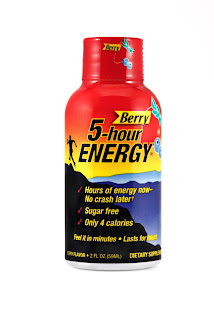 |
| Stimulants are one way to get extra energy. Image: 5 Hour Energy |
There are multiple types of energy supplements and vitamins available for
purchase, and they accomplish different ends because they affect your body
differently. And you might not even “need” one at all.
Stimulants basically rev up your metabolism. Stimulants include caffeine, guarana, yerba mate, kola nut, green tea, capsaicin (red pepper), Asian ginseng, and Bitter Orange (synephrine). These will help pick you up when you feel groggy or sluggish in the middle of your day. Caffeine is one of the most potent and effective stimulants. Many natural alternatives to caffeine still contain it or something similar to it; most have the same or similar effects as caffeine. They will give you a temporary boost in energy when you need it.
 |
| Green tea contains caffeine, which can give you a boost. Image: Shutterstock |
Calories, much to the disbelief of many, are not the same thing as fat. Calories are, simply put, energy. Carbohydrates (including sugars) are easy for our bodies to break down and absorb as energy, and that’s generally what energy drinks, bars, and gels are full of. The problem is that with too much sugar, our bodies’ glucose levels get spiked and we experience an insulin surge—which can cause problems on its own. For athletes working their bodies hard, carbs can give them the boost they need to refuel or recover. But when you’re not exercising, that spike in glucose will likely quickly lead to a crash, which will make you feel sleepy. And those calories you don’t burn will get converted into fat.
 |
| Eating a healthy diet will help give you an energy boost. Image: Shutterstock |
Consider whether or not you really need it before you try
it, too. If you’re regularly going on just a few hours of sleep, constantly
taking energy supplements could not only be less than optimally effective, it
could be dangerous. As I’m sure you’ve heard before, the best way to boost
energy is to get enough sleep and exercise and eat a healthy diet.

No comments:
Post a Comment